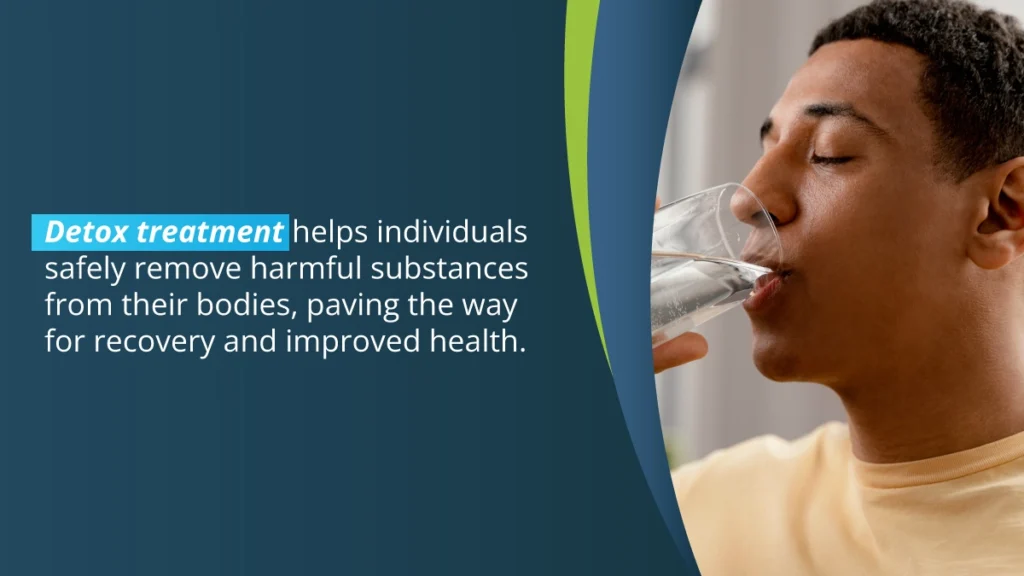Detox treatment is an important first step for individuals seeking recovery from substance abuse or addiction. It involves clearing harmful substances, like drugs or alcohol, from the body. This process can be challenging, often accompanied by various withdrawal symptoms that vary in intensity.
Medical professionals often monitor patients during detox to ensure their safety and comfort. This support is vital for managing symptoms and making the process more manageable. However, detox is not a standalone solution; it is typically followed by ongoing care to support lasting recovery. Continue reading as we explore what detoxification treatment involves.
Key Takeaways
Detox treatment helps individuals safely remove harmful substances from their bodies and begin their recovery journey. Here is what the article covers:
- Detox treatment involves assessment, stabilization, support, and a transition to further care for long-term recovery.
- Detox improves physical and mental health but comes with potential side effects and risks that require medical attention.
- Factors like treatment methods, staff qualifications, and safety records are essential in selecting a detoxification program.
The Haven Detox-New England can help you start recovery from drug and alcohol use disorder (AUD). Call us at (844) 933-4145 to learn about different treatment options.

Introduction To Detox Treatment
Detox treatment is the process of removing harmful substances from the body, especially when dealing with addiction to drugs or alcohol. This treatment is essential for individuals looking to break free from substance dependence and start their journey to recovery. Detoxification helps manage symptoms of withdrawal, making the transition to sobriety safer and more comfortable.
There are several types of detox treatment, each tailored to individual needs:
Medical Detox
Medical detox is a supervised process where healthcare professionals monitor patients as they withdraw from drugs or alcohol. This type of detox is crucial for individuals with severe substance use disorders (SUD), as withdrawal can be dangerous. A medical detox program provides medications to ease symptoms and ensure safety during the process. This type is often conducted in specialized treatment facilities.
Natural Detox
Natural detox involves using non-medical methods to cleanse the body. This can include lifestyle changes like adopting a healthy detox diet, increasing hydration, and using natural supplements. People may also exercise and practice mindfulness, like yoga and meditation. While natural detox can be helpful for minor substance issues, it is essential to consult professionals for serious addictions.
Rapid Detox
Rapid detox is a fast-paced detox method that aims to shorten the withdrawal period. This method involves using anesthesia and medications to speed up the drug detoxification process. While it can be effective, rapid detox carries higher risks and may not be appropriate for everyone. It is essential to consult with a healthcare professional before undergoing this type of detox.
The Detox Process
Detox treatment involves several important steps to help individuals safely remove substances from their bodies. Each stage plays a crucial role in ensuring a successful recovery.
Assessment
The detox process starts with assessment. In this step, treatment providers evaluate the person’s needs. They ask questions about drug use, medical history, and mental health to help them understand how to support the individual best. They may also perform tests to check for health issues. The goal is to create a safe and effective detox plan that fits the person’s situation.
Stabilization
Next is stabilization. In this stage, the focus is on the person’s safety and comfort. Medical staff monitor withdrawal symptoms and provide care. They may give different medications to ease pain or discomfort. This support helps the body adjust to the lack of drugs or alcohol. Stabilization can take a few days to weeks, depending on the individual’s situation. It is a crucial step in the detox process.
Support
Support is crucial throughout detox. Individuals often feel anxiety, fear, and physical discomfort. Having a strong support system is essential to their success. Healthcare providers, counselors, and support groups play significant roles in offering emotional and psychological help. This support can help individuals feel less alone and encourage them to stay committed to their addiction recovery journey.
Transition
The final stage of detox is transition. Here, individuals prepare to move into the next phase of the recovery process, such as inpatient rehab or outpatient rehab. This stage often involves creating a long-term treatment plan. The goal is to help individuals maintain their sobriety and build a healthier lifestyle. A well-structured transition increases the chances of lasting success in overcoming substance use.
Benefits Of Detox Treatment
Detox treatment offers many benefits for individuals seeking to overcome substance use. These benefits can help improve both physical and mental health.
Physical Health Benefits
One major benefit of detox treatment is improvements in physical health. When individuals stop using drugs or alcohol, their bodies can start to heal. Many people notice better sleep, more energy, and improved appetite. Detox helps clear toxins from the body, lowering the risk of serious health issues. Overall, individuals often feel stronger and more vibrant after completing drug detox.
Mental Health Benefits
Detox treatment also greatly affects mental health. Many people face anxiety, depression, or mood swings while using drugs and alcohol. Detox helps reduce these symptoms. As the body cleanses itself, mental clarity often improves. Individuals may feel more in control of their thoughts and emotions. This positive change can lead to better coping skills and a more balanced mind.
Long-Term Recovery And Wellness
Finally, detox treatment lays the groundwork for long-term recovery and wellness. It prepares individuals for further treatment, such as therapy or support groups. By completing detox, people build a strong foundation for their recovery journey. This support increases their chances of lasting success. Overall, drug detox treatment helps individuals lead healthier and more fulfilling lives.
Risks And Considerations
While detox treatment has many benefits, it comes with risks and considerations. Understanding these risks is important for anyone looking to start the detox process.
Potential Side Effects
Detox can cause several side effects. Common side effects include nausea, headaches, and fatigue. Some people may also feel anxious or irritable. These effects can vary based on the substance used and the length of use. While many side effects are mild, some can be severe. It is vital to stay in touch with healthcare providers during the detox process to address any issues.
When To Seek Medical Supervision
It’s essential to seek medical supervision during detox, especially for those with a long history of substance use. If withdrawal symptoms become severe or unmanageable, individuals should contact a healthcare provider. Signs that medical help is needed include severe pain, confusion, or fainting. Medical professionals can provide support and medication to ease these symptoms and ensure safety.
Contraindications For Detox Programs
Certain conditions may prevent someone from safely participating in detox programs. Individuals with severe medical issues, such as heart disease or respiratory problems, should avoid detox without medical supervision. Pregnant women also require special care during detox due to the risks involved. It’s important to discuss any health concerns with a healthcare provider before starting the detox.
Choosing The Right Detox Program
Choosing a detox program is an important step toward recovery. Many options are available, and finding the right fit can make a big difference.
Factors To Consider
When selecting a drug or alcohol detox program, think about the type of substance you need to detox from. Different substances may require different approaches. Look into the program’s treatment methods and whether they fit your needs. Also, consider the program’s location and whether you prefer an inpatient or outpatient setting. Cost is another factor, so check if your insurance covers it.
Questions To Ask Before Starting A Detox
Before enrolling:
- Ask important questions to ensure the detox program is right for you.
- Inquire about the staff’s qualifications and experience.
- Ask about the drug addiction treatment approach and what therapies are offered.
It is also important to know how long the program lasts and what aftercare services are available. Understanding these details can help you make an informed choice.
Signs Of A Reputable Detox Program
Look for signs that indicate a trustworthy detox program. A good program should be licensed and accredited by relevant health authorities. The detox facility should have experienced staff, including doctors and counselors. Additionally, read reviews or testimonials from past clients to gauge their experiences. A strong focus on aftercare is another indicator of a reliable detox program.
Frequently Asked Questions (FAQ)
What is the best way to detox your body?
The best way to detox your body is to focus on healthy habits. Start by drinking plenty of water to flush out toxins. Eat fresh fruits and veggies, as they provide essential vitamins and minerals. Avoid processed foods, sugar, and alcohol. Regular exercise helps improve circulation and boosts your metabolism.
Getting enough sleep is also important for recovery. Add herbal teas, like dandelion or ginger, to support liver health. Lastly, practice stress-reduction techniques, such as meditation or yoga, to promote overall well-being. These steps can help your body naturally detox and feel healthier.
What happens to your body when you detox?
When you detox, your body begins to eliminate toxins and harmful substances. This process can lead to several changes. Initially, you may experience withdrawal symptoms, such as headaches, fatigue, or irritability, as your body adjusts. Your digestion might improve as your system cleanses itself, leading to increased energy levels.
Skin clarity may also improve as toxins are expelled, reducing breakouts. Additionally, your mental clarity and mood can enhance as your body stabilizes. Over time, detoxing can help restore balance, improve overall health, and reduce the risk of chronic diseases, promoting a sense of well-being and vitality.
What happens when you go to detox?
When you go to detox, medical professionals help you safely remove drugs or alcohol from your body. The process begins with an assessment to evaluate your health and substance use. During detox, doctors and nurses monitor your withdrawal symptoms, offering medications if needed to ease discomfort.
You’ll receive support, including counseling, to manage emotional and physical challenges. The goal is to stabilize your body and prepare you for the next steps in recovery. Detox usually lasts a few days to a week, depending on the substance, and helps you start the journey to sobriety in a safe environment.
Find Your Fresh Start At The Haven Detox-New England
Are you ready to break free from drug abuse and addiction and reclaim your future? At The Haven Detox-New England, we believe in your ability to overcome substance use and live a healthier, happier life.
Our treatment center offers medically supervised detox services to safely help your body rid itself of harmful substances, preparing you for the next healing phase. At our residential treatment program, you’ll receive tailored therapies, medications, peer support, and nutritional care. We understand that substance use disorder is often accompanied by other mental health issues as well, and for that, our dual diagnosis program offers complete support. Don’t wait another day to start your journey to recovery. Call us now at (844) 933-4145 and take the essential first step toward a brighter tomorrow.
Verify Insurance
Let’s get you or a loved one help with a few simple steps.
-
Medical Detox




